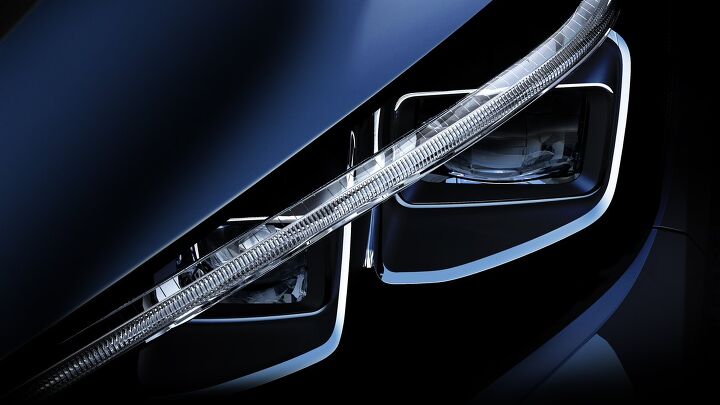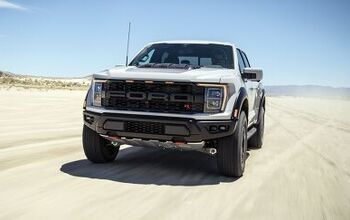Nissan's Next-gen Leaf Will Kind of, Sort of, Drive Itself

After hemming and hawing for what seemed like forever, Nissan will bring American electric vehicle enthusiasts a long-overdue new Leaf later this year. Say goodbye to that old, swoopy body and 107-mile range (at best), and give a cheerful hello to a not-yet-revealed body, undisclosed driving range, and these headlights.
Okay, so there’s not a whole lot known about the next Leaf except that it won’t be an ancient thing that appeared at the dawn of the electric car resurrection. You might be able to drive to a nearby city and back. However, we now know that trip doesn’t have to be as hands-on as it once was.
Announced Thursday, Nissan’s 2018 Leaf will feature the automaker’s ProPilot Assist technology, which takes away some of the driving duties under specific circumstances. This is the latest FCA-like teaser from Nissan regarding the upcoming Leaf. Expect more — summer’s just begun!
Launched last year in the Japanese-market Serena minivan, ProPilot lends vehicles a dose of self-driving capability in highway driving scenarios. This isn’t Level 5 or 4 capability, keep in mind. Not even close. Ever since last year’s Florida Tesla crash, “autonomous vehicle” braggery has seen a shot of reality, with automakers careful to say exactly when, and how, their driver assist technology should be employed.
Think of ProPilot os a combination of lane-keeping and adaptive cruise control, only on steroids. When activated, ProPilot holds the vehicle in its lane, maintaining a safe distance from the vehicle ahead of it and even braking to a stop if necessary. It’s designed to let drivers take a load off during boring commutes or on tiring Interstate slogs.
The various components utilized by ProPilot are seen below:
In a statement, Nissan claims it will flesh out ProPilot with more abilities as technologies advance.
“In the coming years, Nissan’s ProPILOT technology will offer increasing levels of autonomy, with the system eventually able to navigate city intersections,” the automaker said. So, a fairly large hop at the beginning, and baby steps afterwards.
Last year, Nissan claimed it will offer “a multiple-lane, ProPilot autonomous drive technology that allows highway lane change” by 2018. By 2020, the automaker expects the technology to be able to handle driving on urban roads, including navigating intersections.
[Images: Nissan]

More by Steph Willems
Latest Car Reviews
Read moreLatest Product Reviews
Read moreRecent Comments
- Theflyersfan With sedans, especially, I wonder how many of those sales are to rental fleets. With the exception of the Civic and Accord, there are still rows of sedans mixed in with the RAV4s at every airport rental lot. I doubt the breakdown in sales is publicly published, so who knows... GM isn't out of the sedan business - Cadillac exists and I can't believe I'm typing this but they are actually decent - and I think they are making a huge mistake, especially if there's an extended oil price hike (cough...Iran...cough) and people want smaller and hybrids. But if one is only tied to the quarterly shareholder reports and not trends and the big picture, bad decisions like this get made.
- Wjtinfwb Not proud of what Stellantis is rolling out?
- Wjtinfwb Absolutely. But not incredibly high-tech, AWD, mega performance sedans with amazing styling and outrageous price tags. GM needs a new Impala and LeSabre. 6 passenger, comfortable, conservative, dead nuts reliable and inexpensive enough for a family guy making 70k a year or less to be able to afford. Ford should bring back the Fusion, modernized, maybe a bit bigger and give us that Hybrid option again. An updated Taurus, harkening back to the Gen 1 and updated version that easily hold 6, offer a huge trunk, elevated handling and ride and modest power that offers great fuel economy. Like the GM have a version that a working mom can afford. The last decade car makers have focused on building cars that American's want, but eliminated what they need. When a Ford Escape of Chevy Blazer can be optioned up to 50k, you've lost the plot.
- Willie If both nations were actually free market economies I would be totally opposed. The US is closer to being one, but China does a lot to prop up the sectors they want to dominate allowing them to sell WAY below cost, functionally dumping their goods in our market to destroy competition. I have seen this in my area recently with shrimp farmed by Chinese comglomerates being sold super cheap to push local producers (who have to live at US prices and obey US laws) out of business.China also has VERY lax safety and environmental laws which reduce costs greatly. It isn't an equal playing field, they don't play fair.
- Willie ~300,000 Camrys and ~200,000 Accords say there is still a market. My wife has a Camry and we have no desire for a payment on something that has worse fuel economy.



































Comments
Join the conversation
I read rumors elsewhere that the initial versions of the 2018 Leaf won't have 200-mile range.
I would consider an electric car only if/when it is cheaper to operate than a gasoline automobile. All of this high tech so-called "safety" features hold absolutely no interest to me. I guess my wife and I will just keep our 2000 Corolla with 205,000 miles she bought brand new. I'd buy another Corolla just like it if they still built them. The new Corolla has all of those ridiculous features I have no interest in buying, nor having my mechanic trying to diagnose 13 years from now when the car has over 150,000 miles on it.